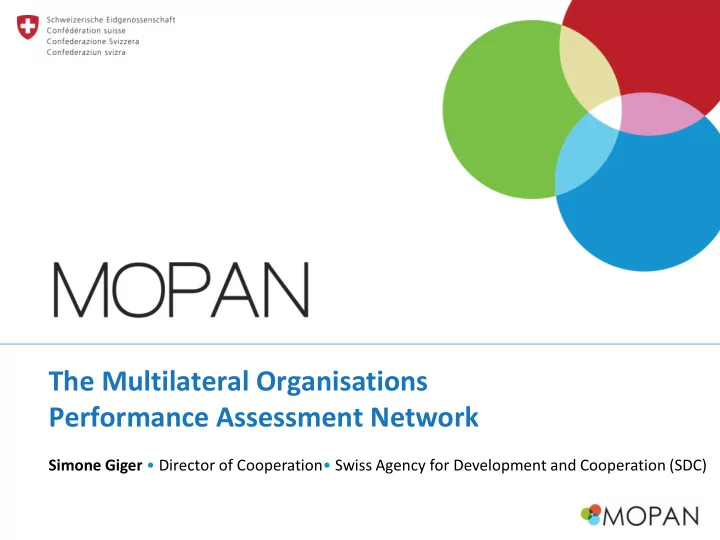

The Multilateral Organisations Performance Assessment Network Simone Giger • Director of Cooperation • Swiss Agency for Development and Cooperation (SDC)
The mission of MOPAN • Support its members in assessing the effectiveness of multilateral organisations (MO) that receive development and humanitarian funding • Aims to strengthen the MOs’ contribution to overall greater development and humanitarian results • To this end, the network generates, collects, analyses and presents relevant and credible information on the organisational and development effectiveness of MOs. • This knowledge base is intended to contribute to organisational learning within and among MOs, their direct clients/partners, and other stakeholders. 2
The members of MOPAN (Jan. 2016) Australia, Canada, Denmark, Finland, France, Germany, Ireland, Japan, Luxembourg, The Netherlands, Norway, Republic of Korea, Spain, Sweden, Switzerland, the United Kingdom and the United States of America 3
Organisations assessed in 2015-2016 and countries where information is collected
Organisations assessed in 2015-2016 and Institutional Leads Organisation Institutional Lead African Development Bank France Gavi Canada GFATM United States of America IDB Canada ILO The Netherlands UNAIDS Luxembourg UNDP Denmark and Republic of Korea UNEP Finland and Sweden UN HABITAT Norway UNICEF The Netherlands and Switzerland UN OCHA Canada and UK World Bank Australia 5
12 ORGANISATIONS IN THIS CYCLE Each organisation has an institutional lead 16 COUNTRIES WHERE DATA IS COLLECTED Each country has a facilitator METHODOLOGY Interviews and Document review Surveys Focus groups and Meta-synthesis A N A L Y S I S FINAL REPORT 6
Actors involved in the assessments MULTILATERAL ORGANISATIONS MOPAN MOPAN Country Facilitators Institutional Leads MOPAN Steering Committee MOPAN Technical SECRETARIAT Working Group CONSULTANT 7
PRESENTATION & DISSEMINATION NOTIFICATION & KICKOFF Institutional Leads Chair of MOPAN Country Facilitators Secretariat Secretariat Institutional Leads PREPARATIONS & DOCUMENT REVIEW (including metasynthesis) Consultants Secretariat REPORT WRITING Consultants Institutional Leads Secretariat SURVEY & INTERVIEWS Consultants Institutional Leads Country Facilitators Secretariat 8
Framing Questions Do multilateral organisations (MOs) have sufficient understanding of the needs and demands they face in the present , and may face in the future? Are MOs using their assets and comparative advantages to maximum effect in the present, and are they prepared for the future? Are their systems, planning and operations fit for purpose? Are they geared in terms of operations to deliver on their mandate? Are MOs delivering and demonstrating relevant and sustainable results in a cost-efficient way? 9
MOPAN 3.0 Indicator Framework PERFORMANCE AREAS TO ASSESS STRATEGIC MANAGEMENT Clear strategic direction geared to key functions, intended results and integration of relevant cross-cutting priorities OPERATIONAL MANAGEMENT Assets and capacities organised behind strategic direction and intended results, to ensure relevance, agility and accountability RELATIONSHIP MANAGEMENT Engaging in inclusive partnerships to support relevance, to leverage effective solutions and to maximise results (in line with Busan Partnerships commitments) PERFORMANCE MANAGEMENT Systems geared to managing and accounting for development and humanitarian results and the use of performance information, including evaluation and lesson-learning Achievement of relevant, inclusive and sustainable contributions to humanitarian and development results in an efficient way RESULTS Achievement of relevant, inclusive and sustainable contributions to humanitarian and development results in an efficient way
Operating Principles Credible, fair and accurate assessments Impartial, systematic and rigorous approach Applying structured tools for enquiry and analysis Balancing Using three Prioritising breadth main streams quality over with depth of evidence quantity Ensuring transparency with an audit trail of findings Focus on organisational learning to ensure utility of findings by multiple stakeholders 11
Thank you. www.mopanonline.org
Recommend
More recommend